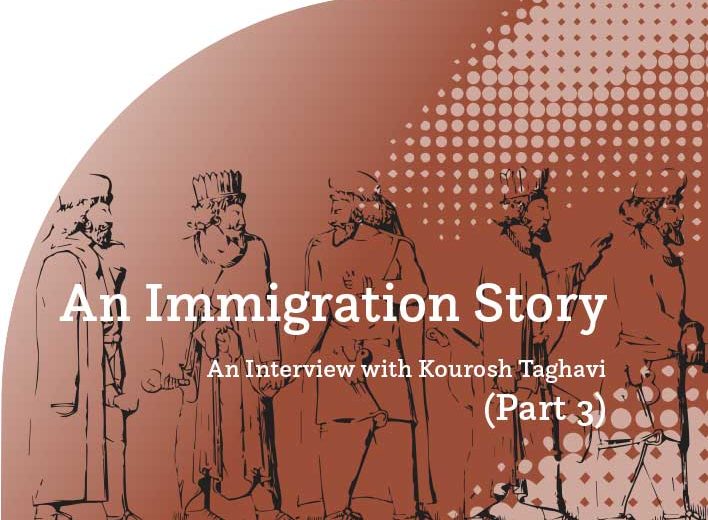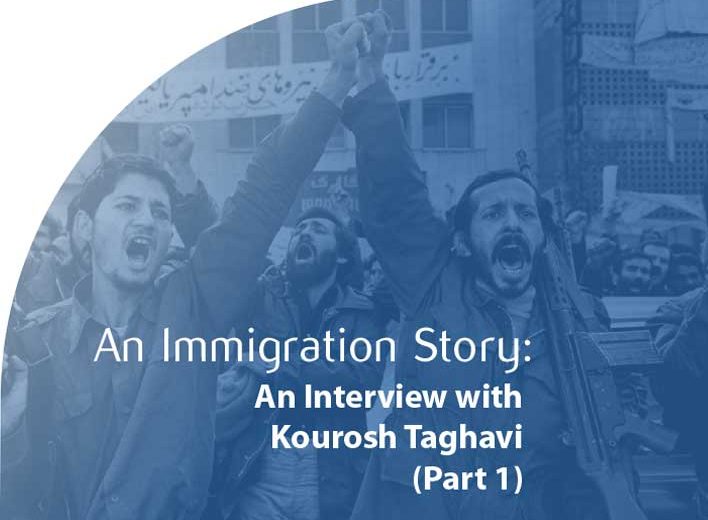Leaving your homeland and residing in another—with a totally new culture, language, and set of laws and regulations—is very challenging and requires a lot of adaptation that, in most cases, is also very frustrating.
But, looking back at those challenges many years later makes some of them look funny, some amazing, and some, of course, sad. The truth is, no matter how we feel about them, the challenges are, for sure, part of the history of immigration that needs to be documented for use by our grandchildren or simply by historians to picture the hardship that first-generation Iranians had to go through to meet those challenges.
Peyk kicked off this column in 2021 with Reza Khabazian’s story, with a goal to encourage our readers to start telling their stories so we can present a diverse documentary. Now that Mr. Khabazian has published his story, it is time for new stories and new voices.

Reza Khabazian (RK): Just to refresh our readers, in the past two episodes, we found out that Mr. A and his wife were both members of a religious minority. In the months before the revolution, their home was attacked by a religious mob which resulted in their belongings being confiscated and their house partially burnt down. They sought refuge at the home of their uncle, who was a prominent businessman in the city of Shiraz. Their hardship intensified after the revolution. Their uncle was arrested, jailed, and charged on the bogus basis of being a spy for the government of Israel. Also, both Mr. and Mrs. A were expelled from their government positions only because of their religious beliefs. In this issue, we continue to cover the rest of their immigration story.
Mr. A: Losing our jobs was probably the last nail in the picture frame of our thoughts that living in Iran may not be a viable option anymore. By this time, we had to believe that we were not welcomed anymore in our country. We were second-, third-, or even fourth-degree citizens. We felt that we no longer had security in our homeland. Please don’t take me wrong—most Iranian people were sympathizing with our situation—but it was the new regime and their followers who made us feel unsafe. It became apparent that our next moves should be: first, trying to sell our house, as is, that was being repaired from fire damage and, second, getting our passports to leave, at least for a few months until the political situation might become more stable. On this occasion, I got all our documents and visited the city official to apply for changing our passports from the old regime to the new one.
(RK): Even after being expelled from government positions, did you really think that the new regime was going to renew your passports?
Mr. A: I was very naïve, I know, to think that way, but very quickly learned the truth in a hard way. After looking at the application and noticing the question about religion, I thought to myself that I was just wasting my time. But I was there and, as it was normal previously, I left the answer to my religion blank. Finally, after a very long wait, when it was my turn and I handed over my application to the man behind the desk, he looked at me and asked:
• “Why didn’t you answer this question?” while pointing at the religion question.
• “We were used to leaving it blank on similar occasions in the past,” I said quietly.
• “You don’t realize that the time has changed?,” he shouted disrespectfully while throwing the application at my face.
• “God forbid, you are not a Bahai, are you?”
• “Yes, I am.”
• “Ahh, we can not renew your passport then. This is the new government order,” he said in an angry tone while looking at the long line of people waiting and shouted “NEXT!”
I walked out of the city office in a very sad mood. I felt like I was inside a cage made of barbed wires. Every move that I wanted to make was painful. A closed cage without any outlet. We had no house to go to, no job to make the living expenses, no permit to leave… and there was a depressed wife waiting for good news at my uncle’s house. The question I kept asking myself was: “What else can we do?” It was with these painful thoughts that I reached my uncle’s home where, to my unbelievable surprise, I saw my uncle.
RK: Wow! He was released from jail! What about the accusation of being a spy?
Mr. A: They knew very well that he was no spy. As I mentioned before, he was very wealthy with several properties and business offices in town. They just brought those charges to force him to donate some of his properties to the new government.
RK: He must have done that, though!
Mr. A: He had no choice but to do that and, to be honest with you, we all were very happy to see him in one piece. Those that were involved with heavy religious activities were not as lucky as he was. They either stayed in prison for a long time or were executed.
RK: How did he react to the passport issue?
Mr. A:
“If you really feel you have to leave the country, there is only one option,” he said with a serious tone. “Cross the border illegally.”
“How dear uncle, with what money?” my wife asked with a desperate voice.
“Do you like to leave or not?” my uncle asked. She paused for a few seconds and looked at me. I saw the pain in her eyes trying to make me answer the painful question.
“As painful as it is for all of us, I think we like to leave if we can sell the house as is to get some money,” I answered.
“Look my son,” my uncle continued in a very fatherly tone, “thinking of selling your house while it is not completely repaired at this time is nothing but foolish. You don’t want to burn your only lifesaving. What you should do is to prepare your departure with some money that I will provide you. Actually, you don’t need that much money. I cover the cost of hiring a guide to help you cross the border and some pocket money to help you for a month. Leave the house untouched. As soon as it is ready, I can rent it out and wait for a better market to sell it. All you need to do is to turn the title over to my wife. If you succeed and want to stay permanently, we can sell the house and send you the money.”
“Yes, we like that option,” I answered after a long pause, looking at my wife to read her thoughts.
With this option being out in the open during our family conversation, we both felt a sigh of relief at the same time, but also a feeling of anxiety at the thought of crossing the border illegally. We never ever thought that one day we would even think about this as a viable option.
RK: As I have heard from other people, crossing the border illegally hasn’t been easy and always came with a number of dangers. If we want to fast forward and skip the hard and emotional moments of saying goodbye to your family members along with your town, your country and leaving all the memories behind, could you tell us your part of the story in regard to crossing the border?
Mr. A: This is a very painful memory for me even to talk about it. Can you please give me some time to mentally prepare myself to talk about that? We can continue in the next session when we meet!
RK: Sure. I understand and appreciate your honesty.

















